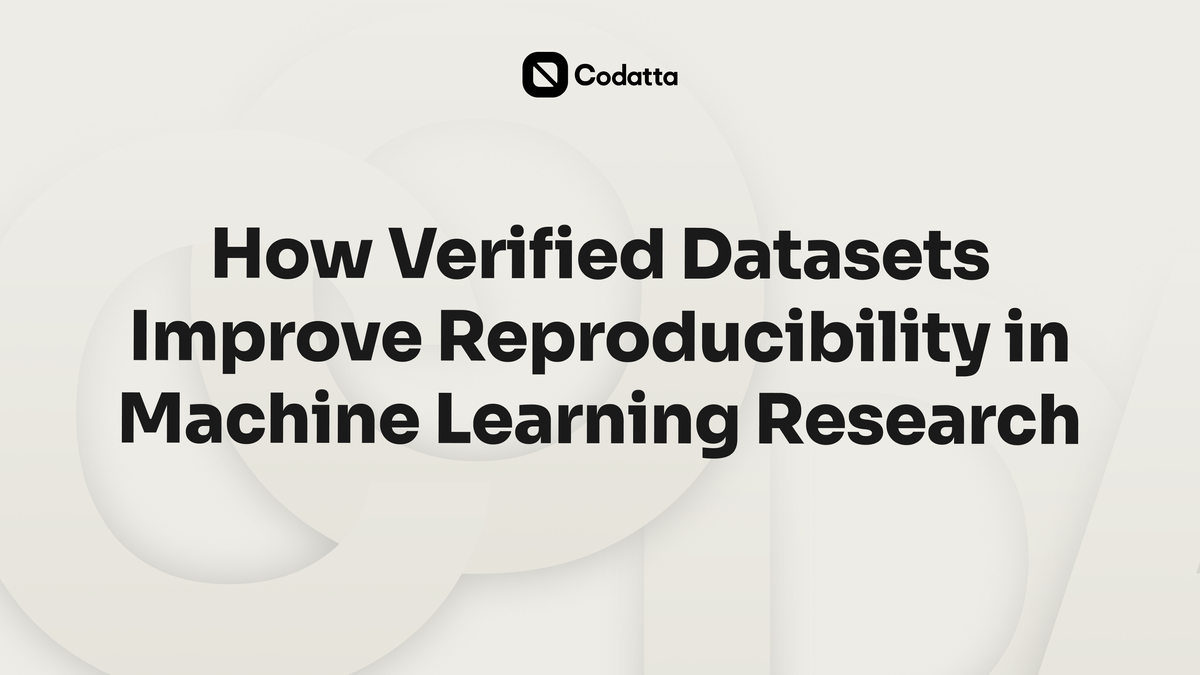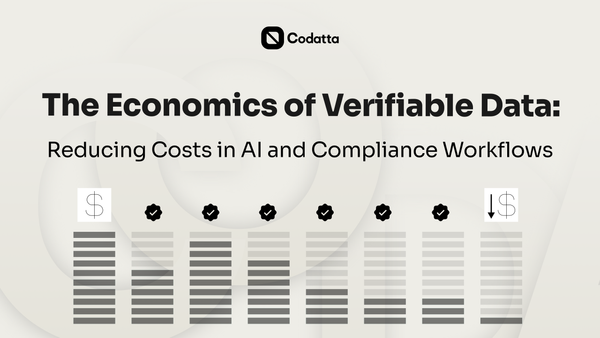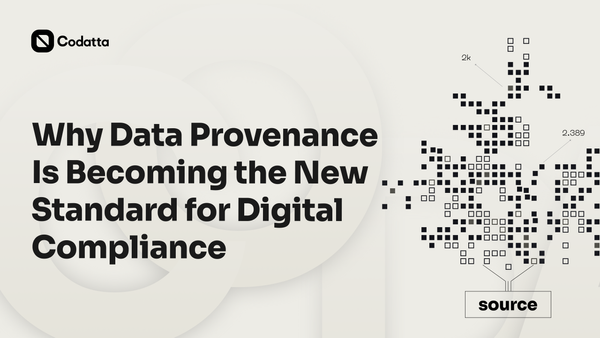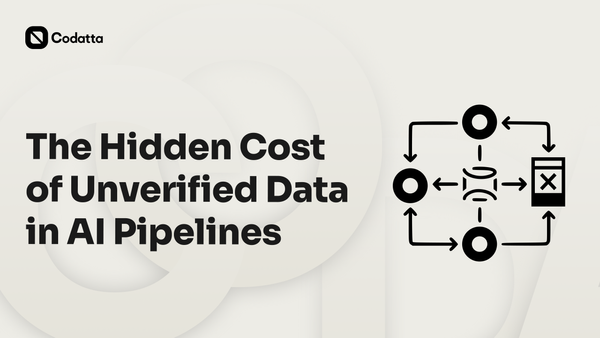How Verified Datasets Improve Reproducibility in Machine Learning Research

Reproducibility remains a major challenge in machine learning research. Many ML models and deep learning studies cannot be replicated because their underlying datasets lack transparency or consistent verification. As shown in recent analyses, unclear data provenance and undocumented preprocessing steps contribute directly to reproducibility issues in artificial intelligence and science research.
The problem often starts with data. When datasets are incomplete, centralized, or unverifiable, models trained on them become difficult to validate or improve. Even small cases of data leakage or inconsistent labeling can distort prediction models and limit reproducible machine learning outcomes.
Codatta builds infrastructure to improve dataset reliability by combining transparent data provenance, contributor validation, and algorithmic confidence scoring. These systems are designed to make data used in AI and ML research more verifiable and reusable across applications.
Read on to learn how verified datasets can strengthen reproducibility and restore trust in machine learning research.
The Root Problem: Unverified and Centralized Data
Reproducibility in machine learning research depends on data that is open, consistent, and verifiable. Yet many machine learning models are still trained on datasets that are incomplete, inaccessible, or poorly documented. These problems make reproducible machine learning difficult and slow down progress in artificial intelligence and scientific research.
Data silos
A major cause of reproducibility issues is that data often sits in isolated systems or organizations that do not share access. When researchers cannot reach the same information, they have to rebuild similar datasets from scratch or rely on limited samples. This reduces the quality of machine learning research and makes it harder to validate prediction models. IBM notes that data silos reduce data quality and lead to repeated, inefficient work that weakens collaboration and reproducibility.
Lack of transparency
Another issue is the lack of clear documentation about how data was collected, labeled, or cleaned. Many datasets used in deep learning or reinforcement learning studies do not include complete metadata or curation details. The Harvard Data Science Review points out that missing information about data provenance is one of the main reasons many ML models cannot be reproduced. When the origins or preparation of data are unclear, other researchers cannot verify or improve the model trained on it.
Low reproducibility
Machine learning-based studies that rely on private or unverifiable datasets make replication almost impossible. Even when researchers share their code, others cannot reproduce the results without the same data. This contributes to the reproducibility crisis in artificial intelligence. A 2023 paper in ScienceDirect found that data leakage, where a model accidentally uses information from the test set during training, is a frequent cause of non-reproducible outcomes.
Inefficient centralized data systems
Centralized data management creates more barriers. When access depends on large institutions or private companies, smaller research teams face high costs and slow data sharing. This leads to duplicated efforts and limits the pace of improvement in machine learning models and learning algorithms. Researchers spend valuable time recreating datasets instead of focusing on reproducible research or improving computational reproducibility.
Improving the reproducibility of machine learning requires verified datasets that are transparent, well-documented, and shared responsibly. This foundation allows the research community to build stronger and more reliable models.
The Role of Verified Datasets in Reproducible Research
When we talk about verified datasets in machine learning research, we mean data collections that have been validated for accuracy, provenance, and consistency. These datasets meet reproducibility standards by including clear metadata, versioning, and documentation that support reproducible machine learning and reliable prediction models.
Traceable data lineage
A verified dataset allows you to trace each data point from its origin through all transformations. For example, in machine learning-based workflows, you can link a data entry to its source, the preprocessing version, and the sample used to train the ML model. Provenance tracking helps identify issues that affect the reproducibility of machine learning and clarifies different types of reproducibility, such as computational and experimental consistency.
Standardized quality metrics
Verified datasets follow documented quality and reproducibility standards. They include information on how data was collected, processed, and validated. This consistency makes it easier for the research community to trust the dataset and reuse it in deep learning models or reinforcement learning projects.
Consistent experimental results
If you train prediction models or deep reinforcement learning systems on a dataset that is verified and versioned, you improve the chances that others can reproduce your findings. This reduces leakage and the reproducibility crisis by ensuring both code and data are traceable and reliable.
Improved collaboration and knowledge sharing
When data is well-documented and verified, research teams can collaborate more effectively. Shared, trusted datasets reduce duplicated efforts and strengthen reproducible research across institutions.
Short example
In blockchain analysis using machine learning to identify fraud, a verified dataset might include labeled accounts, data version history, and clear documentation of how it was prepared. Without this information, a model trained on the data might perform well in one study but fail to reproduce results in another. The same applies to life sciences research using deep learning models for diagnostics, where reproducibility depends on verified data confidence levels and transparent workflows.
How Codatta Contributes to Dataset Verification
Codatta is an open, decentralized, multi‐chain protocol built for verified data collaboration. It brings together human contributors, expert validators, and specialized AI agents to build datasets that can be trusted across machine learning research and real-world applications.
Here’s how Codatta helps improve reproducible machine learning research:
Decentralized data curation
Codatta enables community-driven annotation and quality control. Human contributors label, review, and refine data; their work is visible and auditable. This supports reproducible research by clarifying who did what, and when, helping reduce one obstacle to reproducibility of ML-based research: opaque or undocumented dataset curation.
Blockchain-backed verification
Every contribution is recorded on-chain, creating immutable provenance for each dataset entry. This means you can trace data origin, modifications, and usage. Such traceability supports reproducibility standards and addresses issues like models trained on private data or incomplete metadata, which hinder the reproducibility of ML models and deep learning systems.
Collaborative validation: human + AI
Codatta combines AI agents and human experts to validate data contributions. This blended workflow helps ensure consistency and accuracy — key drivers for increasing the reproducibility of machine learning studies and supporting different types of reproducibility (e.g., computational, experimental) in ML research.
Perpetual royalties for contributors
Contributors don’t just get paid once. With Codatta, verified, reusable datasets become digital assets generating ongoing royalties. That incentive aligns contributor interests with data quality and reuse — important when the performance of ML models and their generalizability depend on reliable, curated datasets.
In summary, Codatta addresses reproducibility issues in ML-based science research by building an infrastructure that maps data provenance, standardizes quality metrics, and supports dataset reuse across the research community. The protocol helps reduce barriers to reproducible machine learning by making dataset curation transparent, verifiable, and incentivised.
Example: Verified Annotations in Practice
At Codatta, one of the most direct examples of verified datasets in action is Account Annotation. This dataset links blockchain addresses with structured metadata such as “CEX,” “DEX,” or “scam.” These verified labels form the foundation for AML tools, on-chain risk management systems, and machine learning studies that depend on high-quality, transparent data.
By building verified annotation frameworks, we enable research using machine learning that meets higher levels of reproducibility. A model trained on verified, well-labeled blockchain data can be validated and reproduced more consistently by other researchers. This helps address long-standing reproducibility issues in ML-based science and improves both the generalizability and reproducibility of research results across domains.
To protect privacy, Codatta does not accept any entity information that could reveal individual ownership of accounts or addresses. Instead, contributors and validators use aggregated confidence scoring to evaluate data quality. These confidence levels allow reproducibility standards to be met without compromising privacy, helping researchers interpret dataset reliability while reducing another barrier to ML reproducibility.
We also extend this approach through User Demographic Annotation. These datasets include attributes such as gender, age group, and region, which can be used to standardize personalized experiences in decentralized applications. When verified and transparently documented, demographic annotations help researchers compare models on private data with consistent evaluation criteria. This supports different types of ML reproducibility, including experimental and statistical validation, across decentralized and privacy-preserving systems.
Together, Account Annotation and User Demographic Annotation illustrate how verified data on Codatta contributes to reproducible machine learning research. By combining structured metadata, privacy protection, and transparent confidence scoring, we make it easier for the research community to build and validate models that are both trustworthy and repeatable.
Why This Matters for AI and ML Research
At Codatta, we believe that verified, transparent datasets are central to building reliable machine learning systems and reproducible machine-learning research. Below is how this matters, and why it’s not purely a technical issue, but one of data integrity.
Model reliability
When you train machine learning algorithms on data where you know the provenance, quality, and preprocessing history, you reduce bias and increase reproducibility. Studies show that a lack of transparency about training data can seriously affect the generalizability and reproducibility of ML models. Verified datasets make it easier to interpret and trust research results because you can inspect and audit the data that underlies deep learning models or other prediction models.
Research collaboration
Sharing data that meets reproducibility standards means research teams can replicate experiments more reliably, compare results with confidence, and build on each other’s work. A recent overview of machine-learning-based research highlights that the lack of shared data and missing documentation are among the main barriers to reproducible research. When datasets are structured, documented, and versioned, collaboration expands, and one drawback of reproducibility checklists becomes less of an issue.
AI accountability
Traceable inputs support explainable outcomes. If you know the dataset, the annotation process, and how it has been curated, you strengthen accountability for models and systems using machine learning. Transparency in data provenance is identified as a key driver of reproducibility in research fields across computer science and biomedical domains.
Reproducibility in AI goes far beyond running the same code twice. It depends on whether the data used to train and test models is well-documented, traceable, and carefully curated. This concept of reproducibility, which covers data, code, experiments, and final results, is what defines credible and repeatable machine learning research.
In short... Verified datasets improve model reliability, enable stronger collaboration, and ensure accountability. These factors map directly to the drivers of reproducibility, address many obstacles to ML-based research reproducibility, and help research teams demonstrate consistent, generalisable results rather than opaque performance claims.
Final Thoughts
Verified datasets are the foundation of reproducible and reliable machine learning research. Without clear provenance, versioning, and documentation, even the best machine learning algorithms or deep learning models face reproducibility issues that limit their impact. As shown in multiple ML-based studies, lack of reproducibility often comes from inconsistent data standards and limited transparency, which hinder the reproducibility of ML-based research across computer science and biomedical fields.
Codatta provides a practical way to address these barriers through decentralized infrastructure for verified data collaboration. Each contribution is recorded and validated, helping increase the reproducibility of research results and supporting different types of reproducibility, from computational to experimental. Through its verification logic and contributor reward system, Codatta creates incentives for data quality, transparency, and reuse. These are key drivers for reproducibility that improve the generalizability and reproducibility of machine learning models trained on open, verifiable data.
Our approach helps the research community map the drivers of reproducibility and reduce obstacles that often hinder reproducible machine learning research, such as models on private data or missing dataset documentation. Verified datasets on Codatta give researchers a clearer path to achieving interpretation reproducibility and reproducibility standards applicable to any research field, including life sciences, computer science, and decentralized systems.
The reproducibility of research depends on the trustworthiness of the data behind every experiment. By combining transparent data provenance, contributor validation, and confidence scoring, Codatta turns verified datasets into a shared foundation for better, more accountable research.
Researchers, data scientists, and developers are invited to explore Codatta’s ecosystem, contribute to verified datasets, and take part in building a more open, reproducible future for machine learning and AI research.




